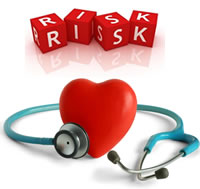HIV
Linked to Increased Heart Failure Risk
SUMMARY
People with HIV, especially those with detectable viral
load, were found to be at increased risk of heart failure
in a study of U.S. veterans. |
By
Paul Dalton
 People
living with HIV are known
to have higher than normal rates of heart disease. The role
that HIV infection itself plays in heart disease tends to
be confounded by several factors, including higher than average
rates of smoking and alcohol abuse among people with HIV,
as well as the possible role some antiretroviral
drugs may play in heart disease. As the population of
people living with HIV in the U.S. ages, HIV's impact on heart
disease becomes increasingly important. The roles that both
HIV and its treatment play in heart disease require more research.
People
living with HIV are known
to have higher than normal rates of heart disease. The role
that HIV infection itself plays in heart disease tends to
be confounded by several factors, including higher than average
rates of smoking and alcohol abuse among people with HIV,
as well as the possible role some antiretroviral
drugs may play in heart disease. As the population of
people living with HIV in the U.S. ages, HIV's impact on heart
disease becomes increasingly important. The roles that both
HIV and its treatment play in heart disease require more research.
To
further understand the role that HIV infection plays in a
person's risk of heart failure, Adeel Butt and colleagues
evaluated the rates of heart failure in a cohort of 8486 people,
of whom 2391 (28%) were living with HIV. The results were
report in the April
25, 2011 issue of the Archives of Internal Medicine.
The
authors analyzed retrospective data from the Veterans Aging
Cohort Study Virtual Cohort (VACS-VC) and the 1999 Large Health
Study of Veteran Enrollees (LHS), looking at the period January
1, 2000 to July 31, 2007.
The
average age in this cohort was 48 years, and about 40% were
African American. The average follow-up period was 7.3 years.
Although the researchers did not provide details about the
sex of participants, VA cohorts tend to be overwhelmingly
male.
While the HIV positive and negative groups were well matched
in most ways there were some noteworthy differences as well.
Nearly 3 times as many people in the HIV positive group were
hepatitis C virus (HCV) positive. People living with HIV had
higher rates of reported smoking and cocaine use in this study,
but lower rates of hypertension and diabetes.
Results
 |
There
were 286 cases of heart failure during the study: 97 among
HIV positive people and 189 among HIV negative participants.
|
 |
The
rate of heart failure was 7.12 per 1000 person-years for
HIV positives, compared to 4.82 per 1000 person-years
for HIV negatives. |
 |
People
with HIV had 1.81 times higher risk of heart failure compared
to HIV negatives (about an 80% increase). |
 |
People
with HIV who had no prior cardiovascular disease or alcohol
abuse diagnosis had 1.96 times higher risk of heart failure.
|
 |
Compared
to HIV negatives, people with HIV and viral load >
500 copies/mL had a 2.28 times higher risk of heart failure.
|
 |
However,
heart failure rates for people with HIV who had undetectable
viral load were similar to those of HIV negatives (adjusted
hazard ratio 1.10). |
 |
Traditional
risk factors such as smoking, hypertension, obesity, age,
and African American race were found to increase the risk
of heart failure across both groups. |
 |
CD4
T-cell count was not a significant risk factor, and HIV
positive people at all CD4 levels had an increased risk
of heart failure. |
"Our
data suggest that HIV infection is a risk factor for heart
failure," the authors of this study concluded. "Ongoing
viral replication is associated with a higher risk of developing
heart failure.
They elaborated in their article, "…HIV infection
is associated with an increased risk of heart failure after
adjusting for traditional risk factors for heart failure.
This association persisted even after exclusion of patients
with a baseline history of coronary heart disease, heart failure
and angina, as well as a coronary heart disease event in the
follow-up period prior to the diagnosis of heart failure and
a history of alcohol abuse or dependence diagnosis."
This study is important in 2 ways. First, the finding that
HIV infection itself, regardless of other risk factors, puts
a person at increased risk of heart failure should emphasize
the importance of cardiovascular health in the management
of HIV disease. Second, this study's finding that people on
effective antiretroviral therapy are able to normalize their
risk of heart failure is likely to add to the arguments for
earlier and more widespread HIV treatment.
Investigator
affiliations: Departments of Medicine, University of Pittsburgh
School of Medicine and Veterans Affairs (VA) Pittsburgh Healthcare
System, Pittsburgh, PA; VA Greater Los Angeles Healthcare
System and the David Geffen School of Medicine at the University
of California, Los Angeles, CA; VA Medical Center and Emory
University School of Medicine, Atlanta, GA; VA Medical Center
and George Washington University, Washington, DC; University
of Maryland School of Medicine and VA Maryland Healthcare
System, Baltimore, MD; Michael E. DeBakey VA Medical Center
and Baylor College of Medicine, Houston, TX; Yale University
School of Medicine and Public Health, New Haven, CT; University
of Maryland School of Medicine and Baltimore VA Medical Center,
Baltimore, MD; VA Connecticut Healthcare System, West Haven,
CT; Department of Epidemiology, University of Pittsburgh Graduate
School of Public Health, Pittsburgh, PA; Center for the Assessment
of Pharmaceutical Practices, Department of Health Policy and
Management, Boston University School of Public Health, Boston,
MA.
4/29/11
Reference
AA
Butt, CC Chang, L Kuller, et al. Risk of heart failure with
human immunodeficiency virus in the absence of prior diagnosis
of coronary heart disease. Archives of Internal Medicine 171(8):737-743
(abstract).
April 25, 2011.
